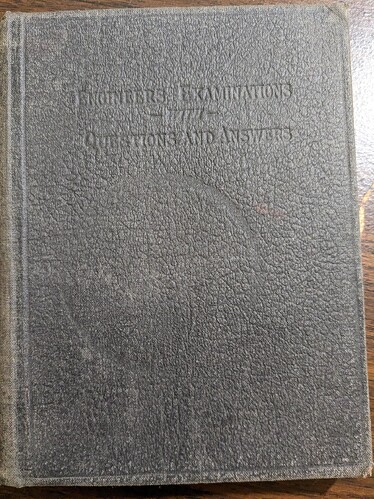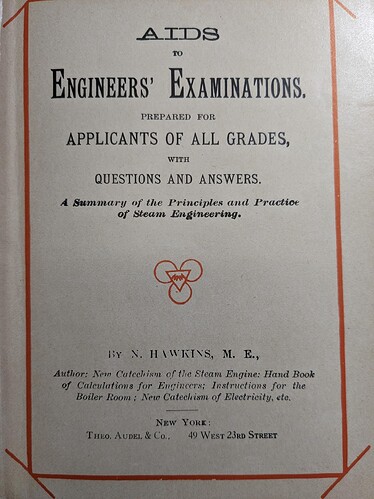The following is a section from an Engineers’ Examinations handbook printed in 1943 that my Grandfather owned. He was Chief Engineer (responsible for operation, maintenance, and repair) on riverboats for a number of years. The first boats he worked on were steam-powered.
“When a man’s knowledge is not in order, the more he has of it the worse he is off.” – OLD PROVERB.
This old saying conveys the strange truth that sometimes the more a man knows, the more useless is what he knows. It is true, notwithstanding its strangeness, and it is true especially in practical steam engineering.
On a certain corner in the Bowery of New York City may be seen a store window packed full of all kinds of cutlery – razors, corkscrews, butcher knives. files, screw drivers, pistols, hammers, boxes of drawing tools and a hundred other things in the hardware line. These are all in one jumbled mass in indescribable confusion, and are an emblem of the disorder in the mind of an unapt, blundering, unskillful man in the engine or boiler room. He has the knowledge, perhaps, but it is never available when needed.
Now, on Park Row, a little south, there is a regular hardware store with a stock of goods a hundred times the variety and a thousand times as large as that in the Bowery, and yet scores of men and many teams serve hundreds of customers every day, and block the sidewalks with the incoming and outgoing loads of their ware, handled in the big many storied building and all without confusion, loss or hurry. This is also a symbol of another kind of man who has his wide and extensive knowledge well in hand for ready use, who easily may assume with credit the position of chief engineer.
What is the key to success in the management of a steam plant and of personal advancement? It consists in the scientific or orderly arrangement of the various knowledge required to make the experienced engineer.
Not only the chief but the assistant engineer, the oiler and the fireman should strive towards this due classification – as soon as a fact is acquired let it be stored away in its proper place in the mind. Facts about steam with the steam (mental) department ---- facts about the engine in the engine. (mental) department; facts about piping and valves with the pipe and valve (mental) department, etc., etc.
In this way the mind and memory are filled with available knowledge like a well written book with a reference index.
For instance all the various items of information relating to the physical properties of steam should be grouped together in the engineer’s mind, or he should know where and when to lay his hands upon needed information relating to this subject. Example: There is a table of steam properties called Regnault’s Tables, which show the temperature of steam at the different pressures, the volume per pound in cubic feet at the different temperatures, etc. Now it is not necessary to carry all the figures in one’s mind, it is only necessary to know of the existence of the Tables, where they are to be found – in what book and in what library, and finally to accurately apply the figures to the problem to be decided.
To know these and other fundamental laws is a long step in the science of steam engineering and the remuneration is large to the man who knows and can use his knowledge.
The rudiments of steam engineering can be acquired by about two years of constant application, and close observation, by a person who has a liking for the work. A person who does not like to perform the duties required will never acquire “full competency” for the duties required of a chief engineer, for the reason that he will not have the opportunity.
A system of education that tends to broaden the mind and thus render it capable of dealing confidently with large questions is not only most likely to make the engineer educated under it more respected by those with whom he comes into contact in professional life, but it gives him a wider range of opportunities.
The immense magnitude of modern steam plants and their combination of Steam, Electricity, Refrigeration, Transportation, etc., calls for first class men to manage the complex machinery.
This theme is a difficult although necessary one, and advice relating to it may be summed up thus –
- FIRST. Do not “lumber” the mind with useless matters.
- SECOND. Be sure of the truth of each single fact.
- THIRD. Store the fact or item of information away in the mind with other kindred items relating to the same department of engineering.
To make the most of oneself is a problem which has been answered by the word concentration. Keep close to one line of advancement and be content to be ignorant of some things in order to know thoroughly some others. The path being chosen, then let the advance be persistent and unceasing. It was thus that Stephenson produced such results in locomotion, and Watt such wonders with the steam engine.
This persistent industry is not irksome. It carries its own reward, and the results are definite and sure.
One step and then another,
And the longest walk is ended;
One stitch and then another,
And the largest rent is mended.
One brick upon another,
And the highest wall is made;
One flake upon another,
And the deepest snow is laid.

